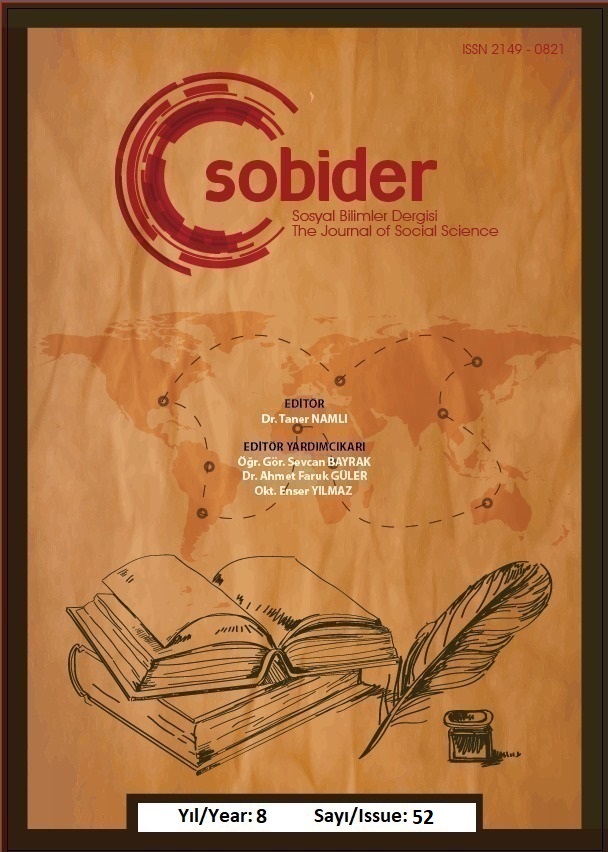YURTDIŞINDA ÜRETİM TESİSİ BULUNAN TEKSTİL İŞLETMELERİNDE BAZI YÖNETSEL DEĞİŞKENLERİN PERFORMANSA ETKİSİNE YÖNELİK BİR ARAŞTIRMA
Author :
Abstract
Türkiye ekonomisinin lokomotiflerinden biri olan tekstil sektörünün bölgesel ve küresel anlamda rekabet avantajı sağlamak amacıyla geliştirdiği stratejilerden biri uluslararası pazara giriş stratejisidir. Bu stratejinin uygulama alanı bulan bir yöntemi yurtdışında üretim tesisi kurarak mevcut birim ürün maliyetini düşürmek ve daha uygun şartlarda rekabet edebilmektir. Bu stratejiyi hayata geçiren işletmeler, kurulan üretim tesisi için çeşitli yönetsel değişkenleri uygulamakta ve performanslarını iyileştirmeyi amaçlamaktadırlar. Çalışmanın temel amacı, yurtdışında üretim tesisi kurma stratejisini uygulayan Türkiye merkezli tekstil işletmelerinde yönetsel değişkenlerin çalışma kapsamında belirlenen performans modelini ne ölçüde etkilediğini belirlemektir. Çalışma kapsamında bağımsız yönetsel değişken olarak işletmenin yönetim ve organizasyon unsurlarından olan yönetim tarzı, yapısal durum ve işletme kültürü kullanılmıştır. Performansı belirlemek için işletmelerin yurtdışı tesisini kurduktan sonra kalite, verimlilik ve kârlılık performansındaki gelişim bütünleştirilmiş ve bu bileşenlerden oluşan bir performans modeli oluşturulmuştur. Yurtdışında üretim tesisi bulunduğu belirlenen 144 tekstil işletmesinin yöneticilerine araştırma kapsamındaki yönetsel değişkenler ve işletmelerinin performansı ile ilgili anket online uygulanmıştır. Anketlerden elde edilen veriler korelasyon ve çoklu regresyon yöntemleri ile analiz edilmiştir. Analizler sonucunda elde edilen denklem, yönetsel değişkenler kullanılarak işletme performansının tahmin edilmesine olanak sağlamıştır. Ayrıca yönetim tarzı ve işletme kültürünün performans modeline etkisinin olmadığı, yapısal durumun ise performans modelini etkilediği ortaya çıkmıştır. Araştırmada yapısal durum; yurtdışındaki işletmenin örgüt yapısı açısından özerk olmamasını ve sürekli Türkiye’deki merkez tarafından kontrol altında tutulmasını ifade etmektedir. Bu kapsamda, yurtdışında üretim tesisi kuran veya kurma stratejisini uygulamak isteyen işletmelere üretim tesisinin tamamen ayrı bir birim gibi bağımsız bırakılmaması, gözlem altında tutması ve faaliyetlerini sürekli olarak raporlarla takip etmesi önerilmektedir.
Keywords
Abstract
One of the strategies that the textile sector, one of the locomotives of Turkey's economy, has developed to gain competitive advantage in the regional and global level is the international market entry strategy. One method that finds place in this strategy is to reduce the current unit product cost by establishing an abroad production facility and to compete under more favourable conditions. Businesses that implement this strategy apply various managerial variables for the established production facility and aim to improve their performance. The main purpose of the study is to determine the affection level of managerial variables to the performance model determined within the scope of the study, in the Turkey based textile businesses which implement the strategy of establishing abroad production facilities. Within the scope of the study, management style, organization structure, and business culture, which are among the management and organizational elements of the business are used as independent managerial variables. To determine performance, the improvement in quality, efficiency, and profitability performance after establishing abroad facilities has been integrated and a performance model consisting of these components has been created. The survey about managerial variables and the performance of businesses within the scope of the research was applied online to the managers of 144 textile enterprises which determined to have abroad production facilities. The data obtained from the survey were analysed by correlation and multiple regression methods. The equation obtained as a result of the analysis enables the company performance to be predicted by using managerial variables. In addition, it has been revealed that the management style and business culture have no effect on the performance model, while the organization structure affects the performance model. Organization structure in research states the abroad facility must not be autonomous in terms of organizational structure and to be kept under control constantly refers to the centre in Turkey. In this context, it is recommended to those who established or who want to use the strategy of establishing abroad production facilities; not to left production facility independent as a completely separate unit, to keep under observation and to monitor its activities with reports continuously.
Keywords
- Ada, E., (2010), “Tedarik Zincirinde Toplam Kalite Yönetimi”, Kadir Has Üniversitesi, Sosyal Bilimler Enstitüsü İşletme Anabilim Dalı, Yüksek Lisans Tezi.
- Akgül, S. and Balıkçı, A. (2003), İstatistiksel Analiz Teknikleri, SPPS’te İşletme Yönetimi Uygulamaları, Ankara: Emek Ofset Ltd. Şti.
- Altunışık, R., Çoşkun, R., Bayraktaroğlu S., and Yıldırım, E. (2005), Sosyal Bilimlerde Araştırma Yöntemleri, Sakarya: Sakarya Kitabevi Yayını.
- Arıkan, R. (2005), Araştırma Teknikleri ve Rapor Hazırlama, Ankara: Asil Yayın.
- Baş, T. (2010), Anket, Ankara: Seçkin Yayıncılık ve San. ve Tic. Aş.
- Büyüköztürk, Ş., Çakmak, E. K., Akgün, Ö. E., Karadeniz, Ş., and Demirel, F. (2010), Bilimsel Araştırma Yöntemleri, Ankara: Pegem Akademi.
- Davis, D. and Cosenza, R. M. (1998), Business Research for Decision Making, Boston: Pws- Kent Publishing Company.
- Demirtaş, M., (2008), “Tedarik Zinciri Yönetiminde Tahminleme ve Planlama İşbirliğinin Rekabet Gücüne Etkisi: Tekstil Sektöründe Bir Uygulama”, Afyon Kocatepe Üniversitesi, İşletme Anabilim Dalı Doktora Tezi.
- Erkuş, A. (2009), Davranış Bilimleri İçin Bilimsel Araştırma Süreci, Ankara: Seçkin Yayıncılık.
- Kalaycı, Ş. (2010), SPSS Uygulamalı Çok Değişkenli İstatistik Teknikleri, 5. Baskı, Ankara: Asil Yayın Dağıtım.
- Karasar, N. (2008), Bilimsel Araştırma Yöntemi, Ankara: Nobel Yayın Dağıtım.
- Nakip, M. (2013), Pazarlama Araştırma Teknikleri, 3. Baskı, Ankara: Seçkin Yayıncılık.
- Özcan, C. and Ayvaz, B. (2015) “Çoklu Regresyon Yöntemi ile Tedarik Zinciri Performansı ve Uygulama Derecesinin İşletme Kârlılığı Üzerindeki Etkisinin İncelenmesi”, İstanbul Ticaret Üniversitesi, Fen Bilimleri Dergisi, 14 (28), 1-14.
- Özdamar, K. (2004), Paket Programlar ile İstatistiksel Veri Analizi-I, Genişletilmiş 5. Baskı, Eskişehir: Kaan Kitabevi.
- Ryan, C. (1995), Researching Tourist Satisfaction Issues, Concepts, Problems, London: Routledge.
- Sekaran, U. (2003), Research Methods for Business, Fourth Edition, John Wiley & Sons Inc.
- Ulus, T., İnce, C. H., Aliustaoğlu, F. S., and Melez, İ. E. (2010), “Araştırma Nasıl Tasarlanır (I)”, Adli Tıp Dergisi, 24 (2), 40-47.
- Yamane, T. (2001), Temel Örnekleme Yöntemleri, Çev. A. Esin, M. A. Bakır, C. Aydın ve E. Gürbüzsel. İstanbul: Literatür Yayıncılık.
- Yıldırım, M. H. (2007), Yurtdışında Yatırım Yapan Türk İşletmelerinde Örgüt Yapısı ve Karşılaşılan Sorunlar: İmalat Sektöründe Bir Araştırma, Ankara: Ankara Üniversitesi Sosyal Bilimler Enstitüsü, Doktora Tezi.
- Zerenler, M. (2003), Kriz Dönemlerinde İşletmelerin Üretim Süreci Esnekliğinin Şirketlerin Performans ve Yaşam Sürelerine Etkileri Üzerine Bir Araştırma, Konya: Selçuk Üniversitesi Sosyal Bilimler Enstitüsü, Doktora Tezi.





